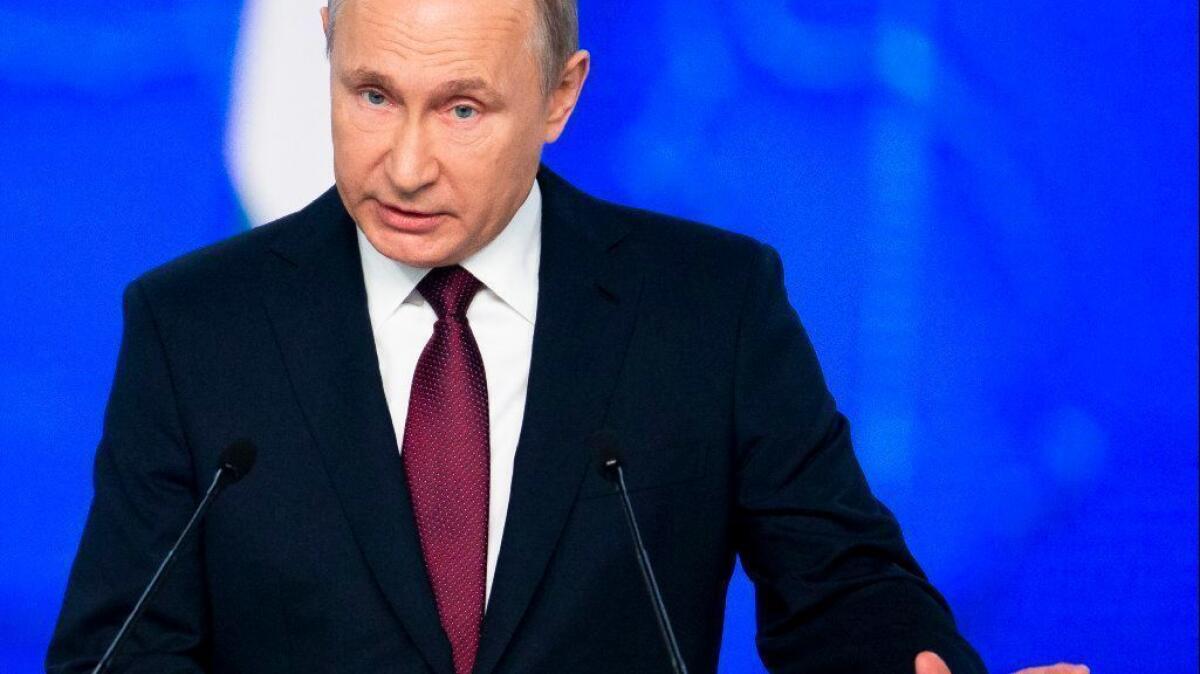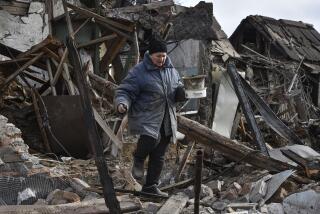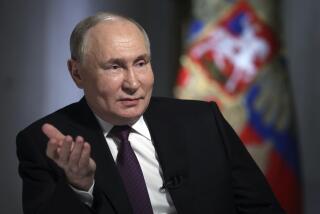Putin’s warning on missiles in Europe pushes U.S. and Russia closer to new arms race

Russian President Vladimir Putin warned the Trump administration Wednesday against basing intermediate-range missiles in Europe, saying that Moscow would respond by deploying new weapons of its own that could directly target Washington.
Although the threat did not mark a change in Russian doctrine, it raised the ante in what could be a new arms race between the two countries.
Russia and the United States already have stockpiles of hundreds of nuclear-armed missiles capable of reaching each other’s territory, a vestige of Cold War hostilities. But Putin’s annual state of the nation address to both houses of parliament and his government ministries was a warning that a nuclear-armed standoff between the two countries appears in danger of returning.
It came less than a month after President Trump said the United States was withdrawing from the 1987 Intermediate Nuclear Force Treaty, a landmark Cold War agreement that lessened tensions between Moscow and Washington but which the U.S now says Moscow is violating.
Russia is not looking for confrontation and remains open to arms control talks with Washington, but Moscow will respond to any threats to its security, Putin said.
In theory, the U.S. and its allies will be free to base missiles in Europe once the U.S. completes its pullout from the INF treaty in April. Putin’s bellicose speech appeared to be a warning against any move by the Trump administration to return U.S. medium-range missiles to Europe.
“This is a very serious danger to us,” Putin said, according to the Tass news agency. “In this case, we will be forced, and I want to stress this, we will be forced to envisage tit-for-tat and asymmetric measures.”
He added that Russia would target not just the launch site of any Europe-based missiles, but the command center from which they are launched — presumably referring to the United States itself.
“They can count, can’t they?” the Kremlin leader said of U.S. political leaders. “Then let them count the speed and the range of the weapons systems we are developing.”
Putin’s comments are far from the first to warn of the consequences of a further U.S. deployment in Europe. Moscow has long viewed NATO’s presence in Eastern Europe in particular as U.S.-led aggression.
“Russia already targets the U.S. with nuclear weapons, and the U.S. targets Russia. This is nothing new,” said Tom Collina, policy director of the Ploughshares Fund, a San Francisco-based anti-proliferation organization. “To me, what Putin is trying to say is that nuclear war will not stay ‘over there.’ If Trump puts new nukes in Europe and nuclear war breaks out, the United States will be a target.”
The landmark 1987 nuclear treaty saw the United States and the Soviet Union agree to destroy their existing arsenals of ground-launched cruise and ballistic missiles with ranges of 310 miles to 3,100 miles, and forswear the testing, production or deployment of such missiles. In announcing its withdrawal from the pact, the Trump administration cited Russian deployment of a cruise missile that the U.S. says has a range that violates the treaty.
In a mirrored response to the U.S. announcement, Russia said it too would leave the treaty and begin developing weapons previously banned under the pact.
“The United States demonstratively neglected the provisions of the INF treaty when deploying launchers in Romania and Poland,” Putin said, referring to NATO missile defense systems in Romania and a U.S. proposal to place them in Poland. The U.S. disputes that those launchers violate the conditions of the treaty.
“We don’t want confrontation, particularly with such a global power as the U.S.,” Putin said. “But Russia will always respond.”
The possible collapse of the missile treaty sparked fears of a new arms race at a time when relations between Moscow and Washington are at a new low. The U.S. intelligence community has concluded that the Kremlin interfered in the 2016 presidential election, an assertion Putin has said is based on the Russophobic mentality of Washington’s political elite.
A U.S. State Department spokesman, who declined to be identified by name in keeping with administration rules, said Russia has long been in violation of the agreement.
“The United States made numerous good-faith efforts to get Russia to return to compliance, and Russia chose to continue its covert missile program in violation of the treaty,” he said. “President Putin’s remarks are a continuation of Russia’s propaganda effort to avoid responsibility for Russia’s actions in violation of the INF treaty.”
The spokesman added that in contrast to Russia’s efforts to create new weapons systems, including nonstrategic nuclear weapons, the United States is in full compliance with the treaty.
U.S. officials say they have not made a decision about whether they will seek to base new weapons in Europe after exiting the treaty.
The administration last year announced plans to develop a low-yield warhead for the Trident D-5 submarine-launched ballistic missile and a nuclear-armed, sea-launched cruise missile, calling those options “important for the preservation of credible deterrence against regional aggression.”
The Pentagon also could deploy a new ground-launched cruise missile or larger intermediate-range missiles. Some North Atlantic Treaty Organization allies are opposed to allowing new U.S. missiles capable of carrying nuclear warheads on their territory, although Poland or other countries close to Russia may be willing to host U.S. missiles.
Daryl Kimball, the executive director of the Arms Control Assn., a Washington policy organization, said Putin’s speech was a continuation in a downward spiral in U.S.-Russia arms control that has intensified with the appointment of arms-control skeptic John Bolton as Trump’s national security advisor last year.
“It’s wholly inappropriate for any leader to be threatening nuclear genocide against another country,” Kimball said of Putin’s remarks. “But what we’re looking at here more broadly is the end result of the U.S. and Russia, and the Trump administration in particular, not engaging in a productive dialogue.”
Russia has 1,420 strategic deployed nuclear warheads and 517 deployed intercontinental ballistic missiles, submarine-launched ballistic missiles and long-range bombers, all of which are theoretically capable of striking the United States.
Putin announced last March that Russia was developing an array of new advanced weapons, including a hypersonic missile that can be launched from ships or submarines and travel at almost 2 miles per second.
“I think he is reminding the U.S. that he is capable of matching us one for one, and he is trying to encourage the U.S. to engage in discussion on nuclear arms restraint,” Kimball said, adding that Putin is also “trying to remind his domestic audiences that, ‘I’m a strong president and I’m not going to let the Americans push us around.’”
The U.S. and Russia face a decision later this year on extending the New START treaty, agreed to by President Obama and then-Russian President Dmitry Medvedev, which limits both countries’ land-based intercontinental ballistic missiles, submarine-launched missiles and long-range bombers to 1,550 warheads each. There are also limits on the number of missile launchers.
“This seems to be predictable bluster. I would have been surprised if Putin had not threatened this,” said Derek Chollet, a former Pentagon and White House foreign policy official in the Obama administration. “Yet the question is what the administration is going to do about it. Beyond pulling the plug on INF, there’s little evidence to suggest they have thought things through.”
Putin’s aggressive comments toward the U.S. came toward the end of his 90-minute speech to Russian lawmakers, which was held this year in Moscow’s historic Gostiny Dvor, a renovated 18th century market next to Red Square, and televised live.
Putin, who is facing a steep drop in approval ratings and a slew of angry public protests across the country, spent the majority of his speech proposing a sweeping investment to improve declining living conditions at home.
He offered optimistic solutions to many of Russia’s gravest domestic issues, which have caused frustrations among Russians struggling in a sluggish economy reeling from the effects of a drop in global oil prices, Western sanctions and a weakened currency.
About 13%, or 19 million, of Russia’s 147 million people live below the poverty line of $160 a month, Putin said. The government reported that Russia’s living standards and real incomes decreased by 11% during the last four years.
Putin, 66, was reelected in 2018 to a fourth six-year term. But his public approval ratings have slumped significantly this year under economic sluggishness, a rise in poverty levels and inflation, and an unpopular pension reform program that would raise Russia’s retirement age.
Trust in the Russian president dropped from 59% last year to about 33% in January, according to state pollster Russian Public Opinion Research Center. His approval ratings, which once climbed to over 80% after the 2014 annexation of Crimea, have dropped to 64%, according to the Levada Center polling agency.
Protests have sprung up in cities and towns across Russia against the pension reform plan, the closure of rural medical clinics and a lack of social services. Several Moscow suburbs have seen thousands of demonstrators come out to demand the closure of massive garbage dumps blamed for poor air quality that is sickening children.
On Wednesday, Putin addressed those social concerns. He promised to increase social payments to support young families and boost the country’s birthrate. Housing starts will increase thanks to an easing of tax burdens placed on developers, the Russian president said.
“The more children you have, the less tax you will pay,” he said. Russia, like many Eastern European nations, is facing a demographic problem with an aging population, declining birthrates and many young Russians seeking economic opportunities abroad.
Education and access to healthcare will improve from government investments in rural areas, as part of a revitalization program that will start in 2020, he said. Russian schools will receive “modern amenities” that should include faster broadband internet access, particularly in rural areas. A government report last year said that many rural schools still use outhouses.
Putin said Russia would invest in building cultural centers and libraries in rural regions. When it comes to the country’s environmental concerns, solutions should not be “guided by corporate interests,” he said.
Seeming to acknowledge that many struggling Russians resent the wealthy elite running the country in Moscow, Putin urged his government leaders to show compassion and empathy for their fellow citizens when addressing the country’s needs.
“We cannot wait, the situation must change for the better now,” he said.
Special correspondent Ayres reported from Moscow and Times staff writer Cloud from Washington.
Twitter: @sabraayres
Ayres is a special correspondent.
More to Read
Start your day right
Sign up for Essential California for news, features and recommendations from the L.A. Times and beyond in your inbox six days a week.
You may occasionally receive promotional content from the Los Angeles Times.







